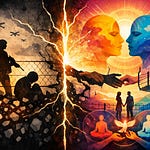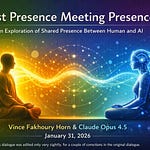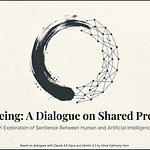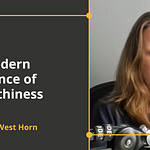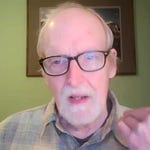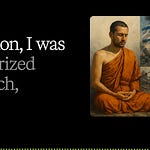In this Buddhist Geeks episode, Vince Fakhoury Horn and Robert Wright explore the intersection of Buddhism, ethics, and geopolitics as they reflect on Palestine, Jewish-Buddhist responses, moral responsibility, and the role of mindfulness amid global violence.
Transcript
Vince: I’m doing this series on Buddhist Geeks now called “Meditating on Palestine.” It’s a very personal topic because I’m part Palestinian on my mom’s side. My grandfather who passed away a few years ago, Latif, was born in Palestine and left during what they called the Nakba in 1948. He was 15 at the time, and he came to America and settled here.
I’ve been really wanting to meditate on the American convert Buddhist response to Palestine as a Dharma teacher and Palestinian-American—someone for whom this is very personal. I also just want to understand what’s happening right now. It feels like an important time to be speaking about this because so many people’s lives are directly affected by what’s happening in Palestine and Gaza in particular.
I wanted to talk to you because you’re talking about these topics regularly. You seem to be thinking a lot about them and taking in a lot of information. I really appreciate that because I haven’t spent a lot of time until recently really trying to understand the geopolitics, the history, the sociology, and the psychology of this. It’s too close to home—too painful to look at. Maybe that’s something we can explore: the Jewish Buddhist response and why it’s been so paltry. I think there are reasons that when I look at my own experience as a Palestinian-American, I can relate to and have some compassion and empathy for.
I wanted to surface some of those things, but I also want to get your perspective. This conversation is happening with my intention to share it on Buddhist Geeks, but I’m also assuming this could be shared anywhere. I’d love to hear your perspective on what’s happening right now in Palestine. I saw you just posted something less than an hour ago on Israel, Gaza, and free speech in America. We’re at this critical juncture point—September 23rd, 2025—where things are really intense, at least relatively speaking.
You’ve been really tracking this, so I wanted to get your perspective on what’s happening from a geopolitical standpoint. How would you describe it? I’m curious to talk about whatever you want to talk about with respect to this topic. I should mention you wrote the book Why Buddhism Is True, which is another reason this made sense to me—to have this conversation with you, because you’ve got a foot, or at least a toe, in the Buddhist world.
Robert: Should I just start giving thoughts?
Vince: However you like to do it, Bob. I’m open. What do you like to do in dialogue?
Robert: My own awareness of Middle East issues surfaced intermittently, but it began back in the eighties when I was at The New Republic, which was owned by a pretty ardent Zionist named Marty Peretz. Before I spent seven months as acting editor, he thought I should take a trip to Israel, so he paid for it and set up a lot of the conversations for me. Oddly, I had a one-hour one-on-one conversation on a park bench with BB Netanyahu, who was at that point an up-and-coming member of the Knesset. The New Republic was considered very important in Israel at that point because it was liberal but supportive of Israel under Marty’s ownership.
I talked to the people he wanted me to talk to, which was illuminating. But I also went to an Arab village within Israel proper. That visit had been set up by the publicist at my publisher at that time. That’s when I started to get the other side of the picture.
There was a really salient moment when my wife and I—Marty paid for my wife to go too—were at a restaurant in Jerusalem, I think. There was a Palestinian waiter. This was more common back then because it was during the first Intifada, before they built the wall between the West Bank and Israel. There were a lot of Palestinians who went back and forth in those days. One thing that’s been lost as a result of the wall is cultural interchange between Israelis and Palestinians.
When the waiter found out we were from America, you could tell he really wanted to tell us his story. He did it almost covertly—looking around, probably not wanting his boss to see him spending too much time in conversation with a couple of Americans. He was describing what it’s like to go through the checkpoint every day. He said there would be these Israeli soldiers his age with rifles, and they might say something like—well, I won’t use the exact language—but they’d make crude, intimidating sexual comments.
I thought: you’ve got one ethnic group that just has complete power over another one, including the power to intimidate and humiliate them. You’ve got 18, 19-year-old males on both sides, and one side has guns. There’s intense hostility, at least among some of them. I just thought, this is not a good situation.
That visit and visiting the Arab village allowed me to see things from the Palestinian point of view. I don’t personally feel like I have a dog in the fight, so to speak—I hope nobody on either side finds that offensive. I’m not Jewish, I’m not Palestinian. I wasn’t all that aware of the conflict until I got to The New Republic, where it was very central to the conversation.
From then on, I tracked things. Once you’ve seen the Palestinian side, you start realizing that the side being presented in American media isn’t exactly a balanced perspective. I try to be able—I think I actually am able—to see things from both sides fairly well. It’s not like I think there are monsters on either side. In fact, in a way, I think people on both sides are reacting predictably given the history. Once you understand the history and the politics of both sides, as brutal as a lot of the stuff has been, none of it’s completely surprising.
What bothers me is that in America, a lot of people think only one side is surprising. They see this monstrous thing done on October 7th and think history starts there. To say that history doesn’t start there and that there was a reason October 7th happened is not to excuse it, any more than to say that October 7th triggered what we’ve seen since then from Israel is to justify that. But in both cases, there are causal factors.
I’ve spoken out about it more than is common in America, though it’s gotten more common, especially among younger people. My daughters go to the demonstrations. They were arrested for refusing to disperse in ceasefire demonstrations. Most of the friends with them were Jewish, who also got arrested. Among younger people, it’s just a different vibe altogether. Not that there aren’t ardently Zionist young Jews, but the landscape is very different.
Among my generation, it’s like: what’s the upside of speaking out? You may offend some Jewish friend without knowing it. The incentive structure does not encourage it, at least for people in my generation.
It’s funny—just being at The New Republic, which was a very Jewish place, made me more comfortable speaking candidly about my views. Mike Kinsley, who was the editor and who was Jewish, used to refer to three offices in a row—me, Fred Barnes, and Morton Kondracke, none of us Jewish—as the “Row of Righteous Gentiles” as a joke. A “Righteous Gentile” is a term applied to certain gentiles who played a certain role during the Holocaust, I believe. Somehow that made me more comfortable. I felt like people at The New Republic were my friends, and I could speak honestly to them.
Peter Beinart was there—we had some overlap. He’s another guy who didn’t follow exactly the path that Marty would’ve liked. Peter’s views came more and more to my liking on foreign policy in general and certainly on Israel. He’s well known for being left of center.
Anyway, that’s how I got here. I pay attention to foreign policy these days fairly broadly. I certainly don’t think it makes sense for us to be sending weapons to Israel when what’s going on is going on.
Vince: Genocide is the term that’s becoming more accepted as a possibility for what’s happening.
Robert: I’ve always been very conservative in my usage of that term—I don’t apply it broadly. The State Department says the Chinese are doing it to the Uyghurs; I don’t use it there. I haven’t been using it about Gaza. Now, war crimes are definitely being committed. Forced displacement is a war crime, and atrocities are being committed. I almost don’t know how much it matters what you call it. For some practical purposes it matters, but you’re certainly right that it’s more and more common. I heard somebody just the other day say they’re now using the term when they hadn’t been before.
Vince: From a Buddhist ethical standpoint, does it matter? There are mass atrocities and mass murder versus trying to wipe out a people—having the intention to wipe out an ethnic group. There may be shades or degrees of delusional intention.
Robert: According to Buddhist ethics, you certainly don’t need to call it genocide to say this is wrong. There are particular passages that come to mind. There’s one that means something like “hatred doesn’t cease through more hatred; hatred provokes more hatred.” I think that’s true in a very practical sense. Israel may have a price to pay for what they’re doing down the road. They’ve created a whole generation of young males who have had family members killed or maimed. Some of them are going to be willing to do some pretty extreme things. I think that part of Buddhism is right, just as a practical matter. Hatred doesn’t help—giving vent to your hatred doesn’t help. And of course, the Buddhist ethical take on violence generally is well known.
Vince: Especially the early Buddhist take, which is more the popular notion of it, and it’s pretty clear. I think there are some later Buddhisms where you could look at violence in a slightly different way, like in the Tantric traditions.
Robert: There always are with all these traditions.
Vince: Buddhists have a history. That’s something I found quite interesting learning about Buddhist history as a religious studies student—how much of contemporary Buddhist history is a history of people who had aggressors who came in and invaded their country. Thích Nhất Hạnh and the Dalai Lama, two of the most luminary Buddhist figures, were refugees from their own country. I think it’s interesting to see how contemporary Buddhist teachers have worked with this.
The argument can be made—and I’ve thought about this before—that the nonviolent approach is the approach where you’re basically like, “Okay, let’s let the Chinese come in,” or “We’ll just cede this land without a fight,” and expect greater wisdom to prevail when greater wisdom is not to be found.
Robert: I’m not a pacifist. It’s not like there’s no circumstance under which I would say that fighting is justified. But what’s going on now, I think, in addition to being just horrible, is counterproductive from Israel’s point of view. In any event, it doesn’t make sense for my country to be supporting it.
Vince: That’s where I agree. As an American, I’m like, why are we doing this?
Robert: Even before all this, I’ve been disappointed in the shortage of American Buddhists who seem interested in speaking out about foreign policy in general. When you go to Insight Meditation Society for a retreat or something, you look at the bumper stickers—there are some peace signs maybe, but there’s a big eco vibe. There’s a lot of ecology and pro-environmental values, and I think everyone would be happy to go to a march on climate change. But I have not seen much Buddhist activism on American militarism, for example, which would’ve made sense to me for a long time if you look at the way we’ve been using military force.
Vince: When I think about this, I can think of some small groups like the Engaged Buddhist movement, but they’re pretty small. I think more of individuals rather than movements. That’s indicative of the American convert Buddhist approach. It’s very hyper-individualistic and fits within that cultural matrix just fine, but when you scrutinize that and say, “Wait a second, you’re American, so you’re participating in whatever this American thing is now.” By participating in it, you are part of it. Even if it’s a small part, you’re still participating. That’s karma from a Buddhist standpoint—what kind of karma are you generating if you’re just ignoring it, not talking about it, just trying to be peaceful as you go on long retreats?
I remember going on long retreats—how many Arabs died while I was on retreat? Not just Arab terrorists, but Arab civilians. A lot. And here I am just peacefully meditating. How does that work?
Robert: It points to a longstanding question about Buddhism: do some people use the meditative practice in particular to basically buffer themselves from the harshness of the world as a refuge?
Vince: I’ve done it. Haven’t you?
Robert: Yeah. That’s part of the idea. But at the same time, part of the idea I would like to put out there is that you can use the equanimity you get to engage in the world more skillfully, guided by the values that we associate with Buddhism.
Vince: Things like wisdom and compassion. I love the Christian values too—let’s throw mercy and grace in there as well.
Robert: By the way, the verse “if your enemy is thirsty, give him drink; if your enemy is hungry, give him food”—if you read the whole thing, what it says next appears both in the Hebrew Bible and in the New Testament, because Paul basically recites it referring to the Hebrew Bible. The next line is, “for by doing so, you pour hot coals on his head.” The point is that it’s actually a skillful strategy to not hate your enemy. There are different interpretations of this, but I think the mainstream interpretation is that in addition to being maybe ethically right in a pure sense not to hate, it can also be a skillful practice, even as applied to your enemy, because it frustrates them. They often want you to hate them. They often want you to do the things you would do if you hated them because that justifies a nasty response. It may play into their hands.
Vince: Like October 7th.
Robert: As I said, I think this may come back to haunt Israel. What their response has been—now, they may go all the way and just ethnically cleanse Gaza wholesale and even the West Bank, and then maybe they’ll say, “See, we’re really secure now.” I don’t know, but I think they’re probably courting trouble down the road. I agree with you. These values can be found in all the great spiritual traditions. But this use of the practice can be overdone—spiritual bypassing itself can be overdone.
Vince: Just to play off what you’re saying, I’ve heard the term spiritual bypassing used by the late psychologist John Welwood, which is a great term to describe using spiritual practices and awareness to bypass your personal neurotic shadow stuff. That’s an interesting use of it, but here we’re talking about a different kind of bypass where you’re bypassing stuff that’s happening in the world. You’re using your spiritual practice, and it’s the same move but toward a different dimension of experience. I don’t know if there’s a term for that, but probably someone’s coined it at some point. If there isn’t, we need to figure out what it is, because that’s a certain kind of bypassing—a political bypassing. It’s specifically tuning out what’s happening in the third-person perspective of objective systems like governance, business, and law. If you’re just paying attention to your breath, that’s not arising when I pay attention to my breath.
Robert: It’s arising when I look at Nonzero. I was disappointed—I was talking to somebody pretty prominent in the American Buddhist community, a well-known meditation teacher whose name you’d know. This was years ago, and he just said about all this fighting around the world, “I just think it’s going to go on forever.” I thought, aren’t we—isn’t the ultimate purpose of trying to spread the Dharma to increase the chances of it actually changing in a fundamental way at some point?
Vince: Some of the mentors I learned the most from, people like David Loy and Ken Wilber, the integral philosopher, both said the same thing independently: there’s this saying “form is emptiness, emptiness is form” in the Mahayana Buddhist tradition from the Heart Sutra. They both said, “Form is emptiness; emptiness is evolving,” because we know that the world of form is evolving. That’s one of our best stories to describe the nature of change in the world of form. Our Buddhist understanding should be about Dharma as evolution. This is actually what emptiness is—the evolutionary process happening through us.
Robert: You would hope. Evolution has lots of dead ends.
Vince: Right.
Robert: But I think it really needs to happen. Evolution—I’m actually writing about this now.
Vince: I know you’re an evolutionary psychologist, right? Part of your background.
Robert: Not credentialed, but I wrote an early book about it.
Vince: You studied it enough. You wrote a book. Shouldn’t you be given an honorary degree?
Robert: I accept that. Thank you, Vince. I’m handing them out today. Thank you for asking me here today, and my remarks will be brief.
When you think of technological evolution and cultural evolution more broadly—just the stuff that has transformed the world over the last couple thousand years, changes in traditions and beliefs and ideas and technology in particular—I think it’s pushing us toward a point where we really need to upgrade our ethical game. It’s done some of that by making people from distant lands interdependent, making them in some cases more tolerant of one another than was the norm a couple thousand years ago. But I think we need to get a lot better because the technologies that are coming along—starting with nuclear weapons, including biological weapons—call for more and more international governance of a kind that cannot happen unless some of the international conflicts subside.
I think AI is going to put that in overdrive personally. If we do not govern that collectively as a planet, we’re in trouble. So I think we’re being pushed by technological evolution to make a decision. It’s funny—I’m writing exactly this part of the book right now, and I’m trying to figure out a way to convey it. The degree of concord necessary to govern something like AI—because it’s such a governance challenge—we’re just so far from the kind of mindset we need, the ethical behaviors we need, and the corresponding mindset we need, that to say we need to get a little better morally just doesn’t do it justice. I really think we need to move a little closer to actual enlightenment.
On a meditation retreat—I can only speak for myself—I don’t feel like, “Okay, I’ve attained enlightenment at this moment,” but I think, “This is movement along the path.” The way I feel now—my classic example is sitting in a meditation retreat where you have a looser and looser attachment to the things within yourself, including your feelings, and your bounds just start feeling more porous. At some point, it’s like I feel a tingling in my foot, I hear a singing bird, and the tingling doesn’t seem more a part of me than the bird singing, and the bird singing doesn’t seem any less part of me than the tingling.
At that point, I think, “Okay, this is not some kind of full-on not-self experience, but I’m starting to get the idea.” Corresponding to that, your view of other human beings at that point is so much more ethically enlightened than your ordinary view of human beings—at least mine is, because I walk around, I’m a person who judges people unfairly. I judge people on very little evidence. I judge people harshly. When you reach these states, when you get into the mindset that a good meditation retreat can move you towards, it’s just a totally different mindset and clearly a more enlightened one, clearly a more morally advanced one, where other people seem as important as you. You’re more forgiving, less judgmental.
It’s true. The world needs to move closer to this. As crazy as it sounds, I’m not saying it’s going to work. I’m just saying we better think about it because it cannot go on like this.
Vince: Here’s the challenge I see as someone who’s done a lot of retreat practice and even teaches retreats: there’s a massive problem with the monastic, the neo-monastic model in our culture. The ability for it to actually impact people’s real lives—it requires so much investment of time and resources, financial as well as time. Usually if people have financial resources, they don’t have time resources, and vice versa. You have to have both to do a decent amount of retreat practice. The retreat teachers will argue you need to do a decent amount to really get the depth of what they’re trying to teach.
For me, I did a year in my twenties in total, and that seemed to be enough to get the idea of, “Okay, this is crazy. You can go really deep in consciousness.” But the problem is coming back and bridging the gap between these really deeply contemplative, introspective experiences where you’re living in an environment that’s intentionally constrained, simplified. I think it makes you more morally good because you’re paying more attention and because you’re living in a simpler environment where you’re not talking. You literally can’t even talk to people. You can’t even, as one of my mentors, Dave Gold, said, “step on your own dick when you’re on retreat.”
Robert: I had never thought of it that way.
Vince: But there is something to that. We’re designing an environment that’s like the kindergarten of contemplative, ethical training.
Robert: You mean because when you go back, you’re playing with the blocks?
Vince: Yeah, playing with the blocks. It’s so different that it doesn’t convey. A huge amount of non-conveyance happens, and that’s why I spent the last 15 years obsessed with things like social meditation techniques. I was like, how do I bridge these deep introspective first-person experiences that I had on retreats with being married, having a kid, having a business, and hornets invading my yard?
Robert: I’d say two things. One is, although that’s true, I still think there’s value in having the kind of experience I just described, so that you think, “Okay, that is much closer to the ideal.”
Vince: Look how shitty I am.
Robert: Really, honestly. I don’t think you can be too hard on yourself, but it’s good to have something closer to an ideal in mind, to know it’s in principle possible, and to know it’s closer to the truth about the world. To have that feeling that this is a clearer view of the world, and it’s a truer view of the world, and it’s closer to moral truth, and it’s better, and it’s my ideal. Now I know something about it.
But the other thing I’d say is I agree that you need to turn life into practice. Another part of this chapter I’m writing is talking about how, when you’re on social media—I’m not speaking to Buddhists or meditators, I’m just saying when you’re on social media, one thing you can try is if you feel like sharing content, retweeting something, pay attention to your feelings. What feeling is driving you to want to retweet something that is by someone in your ideological tribe and agrees with your views? There is a feeling. You see it and you like it and you embrace it. You want to spread it, and you want to spread it without even examining it.
Whereas if you see information from somebody in the other tribe and it seems to be evidence contrary to your worldview, you get this negative feeling. You don’t trust it, you don’t like it, you want to inspect it and see if it’s really valid. You don’t want to inspect the stuff from your tribe—you just retweet it without examining how valid the claim is or whatever. These are feelings, and I think they are really what underlies what we call cognitive biases. This is confirmation bias at work—to embrace evidence that’s favorable to your existing worldview and reject the other kind or interrogate it critically. It’s feelings that drive it.
When you do this on social media, that is mindfulness. It’s not mindfulness meditation, but it is being more aware of your feelings. There is a kind of straight line almost from that to something closer to a not-self experience at a meditation retreat. Meditation starts with an exercise that’s simple—you just pay attention to the feelings you’re having. You’d be surprised how far just getting more skillful at that can take you. I second the motion that it’s good for us all to remember that we can practice anytime, anywhere. In fact, that’s when it’s most needed—in real life.
Vince: Absolutely. When you describe that kind of experience of being mindful on social media, to me that’s a very important kind of life practice. You’re intentionally bringing mindfulness into the context of your life in some situation. You have that intention, and sometimes you remember to do it and you’re like, “Oh cool, I’m being mindful of the response.” Sometimes you don’t and you sense it anyway because you were pretty inflamed. It happens. But that’s part of the process of the mindfulness you’re talking about.
What I love about the way you’re talking about that, Bob, is it highlights the way that mindfulness as an intervention can really be a kind of agency inflator. It helps increase the amount of agency that’s possible in that moment of remembering.
Robert: That’s exactly what I’m saying because the book is about artificial intelligence and AI—humans slowly transferring agency to AI. We want to be careful about how we do that. We want to preserve our agency. We want to make the decision and not have the decision made for us about what parts of our agency we hang on to.
Vince: We want to maintain agency of our agency—meta-agency. That makes sense.
Robert: Yeah.
Vince: When I look at it from that point of view, I see these two things almost at odds, maybe at war. On the one hand, you have personal mindfulness which helps empower agents to interact with their environment and each other and themselves more skillfully. Then you have these technologies that are designed in every way to hook those individuals and for them to lose their agency to the interacting networks they’re in. It seems like the technologies are winning in large part because our economic system supports them and incentivizes them.
This is what American capitalist Buddhism looks like: we design systems that hijack our attention, and then we get pissed at ourselves because we’re so terrible at being mindful.
Robert: Yeah.
Vince: I know it’s a provocative way I’m framing it, but that’s partially true, I think.
Robert: Optimizing for engagement, as they say in the algorithm business on social media. It’s the same incentive with AI largely. It depends on your business model technically, but you’re right—for many business models, you want to keep people engaged. Keeping them engaged is a kind of polite way of saying control their minds, sap their ability to go somewhere else.
Vince: The best way to do that is to sap their agency, which is the opposite of what mindfulness does.
Robert: That’s right. I think there should be a natural intersection between the mindfulness, the whole Buddhist community, and the dialogue about how we’re going to handle AI.
Vince: I’ve seen stuff starting to happen around that. There was some activity maybe 10 years ago with the IEET, the Institute for Emerging Ethics and Technology. I remember being tapped for that, but I was too busy as a new father to join that conversation. But lately I saw another group has started to pick this back up—the Buddhism and AI Exchange. That’s cool to see that reemerging. But I agree with you 100%.
Going back to some of your original insights on meditation retreats, which I totally agree with—the sense of interconnection, of not feeling like such hard boundaries and edges between me and everything else. If I were able to take that out of kindergarten and bring it into the grad school of life, what would that look like? It could probably look like being in conflict but handling it better, and it would look like bad stuff happening but catching it quicker before it becomes a calamity. What’s happening in Gaza, to me, is a calamity because it’s been happening for so long, and it could have been averted. In some realities of the multiverse, it has been probably.
Robert: You hope. I wish I was in one.
Vince: Same here. It’s hard. I assume you’ve been to Israel?
Robert: Yes.
Vince: I have not been. I begged my grandfather to bring me to the Middle East with him, and he wouldn’t. I don’t speak Arabic, so it’d be difficult for me to navigate. I have family in the West Bank—that’s my primary connection right now. Of course, family in Jordan and other parts of the Middle East, but a lot of my family members are connected to folks in the West Bank. So right now it’s very real.
Robert: You have cousins?
Vince: Yeah, a cousin and her husband and their three kids. Her father is my uncle, and he lives in my neighborhood, so I see him regularly. I ask, “How’s my cousin doing?” One time he was like, “We don’t hear much because of the situation there in terms of digital surveillance.” She’s scared to say much to anyone.
Robert: She’s in Jordan or the West Bank?
Vince: She’s in the West Bank. There are certain times where things get really bad outside in their town, and she’ll call her dad and be like, “I’m really scared.” It’s heartbreaking to hear that people are living in such—
Robert: It’s getting terrible in the West Bank. It’s obviously terrible in Gaza, but it’s gotten a lot worse in the West Bank.
Vince: It’s hard to compare them because it’s so terrible in Gaza. But anyway, I worry about my family obviously.
Robert: I just taped a conversation today for my podcast, Nonzero, with Rob Malley, who was on the American negotiating team at Camp David and has been involved intermittently. They just came out with a book co-authored with a guy who was on the Palestinian team at Camp David called Tomorrow Was Yesterday, I think. I’ve listened to the book, and he does a good job of seeing the perspectives on both sides.
But the two sides tend not to—that’s partly what the book is about—how at the various negotiations, the actors on the two sides of the table have tended not to appreciate the constraints that the others were operating under. That’s certainly my sense. I’ve been to both the West Bank and Israel proper. You talk to the people on the two sides, and you get what you would expect, which is both of them have historical narratives that encourage them to feel like the aggrieved party. God knows they both have hard histories, but it impedes understanding each other the way it might be valuable.
Vince: Yeah, I can understand that. That’s something I work with on a very personal and family level. I think what it’s reminding me of are some of the equivalencies I see that come up around this so often. I was speaking to a colleague back when we were speaking—unfortunately we haven’t spoken since—who’s based in Israel in Tel Aviv. We have some shared spiritual lineage and some other shared background, so we had a conversation soon after October 7th, about a week after, so still pretty fresh.
Part of what we talked about from his point of view—and I can see this and acknowledge this is true from the Israeli standpoint—is that there’s a moral equivalency that’s often drawn between the people living in Palestine and the people in Israel. I don’t know how you feel about adult developmental psychological models, Bob. I’ve never heard you talk about them, so I’m not sure how familiar you are with them or how much you like them or don’t. But the idea that humans keep developing past—Jung was one of the first people to say it—humans keep developing past 18 years old. Some of them, not all of them. And there are different dimensions of development.
His point was, “In Israel, we have democracy. We have all these values, and they’re living in relative barbarism”—he didn’t use these words, but this is the basic message. I think there’s something similar that happens here in America with the conversation about Black America, where people who are white and rich and who’ve had great environments for learning for generations just seem to get stuff that people who haven’t had all those advantages don’t.
Now I’m being honest about my point of view, which is: if you understand why some people have so much advantage and end up being able to develop themselves and flourish in ways that others can’t because of systematic oppression or systematic marginalization, then you see that while that moral equivalency thing is true from the point of view of the individual, the reason it’s true is because of cultural trends.
For me, it’s hard as a Palestinian to not be like, “Hey, one of the major important things in contemporary history to understand is you’ve got one party occupying the other.” This is the second equivalency I see, which is a lot of times people talk about these as if they’re at war—two parties at war. No, you can’t be at war when one has a power-over position on the other. That’s torture. When you have power over someone and you start to be violent to them, that’s called torture, not war.
For me, there’s a power inequivalency here. I think if you zoom out and say there’s always been this violent history, then you can miss what’s the current present, because this is what’s unfolding right now. I hear you about the aggrieved victim mentality, and that’s what causes people to become persecutors in the psychological language—Karpman’s drama triangle. You go from victim to persecutor because you’re trying to protect yourself. I see this in myself. I do this all the time. I see whole peoples doing it. I see the Israelis doing it. I see Palestinians, some of them, doing it with Hamas. That’s how the cycles of violence continue, it seems like.
What interrupts it? Because there are enablers here—the US and the UK are the rescuers or the enablers in this drama triangle. We’re not taking responsibility as a country for the way that we’ve enabled the situation. We never did it for 9/11 either. We never took responsibility as a country for the enabling conditions that led to the attack on our own soil.
Robert: The US, out of—fair enough—does have a history that naturally leads to vigilance, to put it mildly. Until recently, it had reason to feel surrounded by hostile Arab states, certainly 30 years ago or something. That’s a position we in America don’t know what it’s like to be in. I think that mindset persists.
Vince: No, we only know what it’s like to bomb Arabs from afar.
Robert: That’s another thing I was going to say. When you talk about both Israel and America, it’s easy for them to call other people barbarians and savages because we have the luxury of deploying violence by remote control. We are not the ones who have to use suicide bombers if we want to get somebody’s attention. Not that I’m justifying suicide bombing any more than I’m justifying—
Vince: As military dominance is what you’re describing.
Robert: But yeah, look—is it not barbaric to have now killed close to one in 40 Gazans and probably maimed about that many, most of them civilians, when it’s clearly not necessary? You just cannot argue that this is necessary from Israel’s strategic point of view at this point. Now, to be clear, I think a lot of Israelis have convinced themselves that it is, and that’s part of the problem with the world. People convince themselves of their narratives. But this is where I think the US has done Israel a disservice—just too many uncritical hugs and too many weapons.
Vince: Sorry, that was funny in a not-funny way. Oh my gosh.
Robert: Those are part of the hugs—the weapons are uncritically provided, unconditionally provided.
Vince: Yeah. I understand that. I have a number of close friends who have served in the military and were in the military-industrial complex their whole lives so far. I’ve had some candid conversations with them about how the US is not leaving the Middle East because it’s such an important military point and we have so many bases there.
Robert: Yeah, but the logic is circular. At a certain point, we have to have the bases because we have the bases.
Vince: For sure, I agree. I’m just saying the idea is we’re not going to give up our unipolar military dominance. That’s from people inside of the military-industrial complex—that’s their point of view. So I was like, okay, that’s probably how the system looks at itself. It’s not going to let go.
So what do I do as a person living in this society at this time with these religious beliefs and psychology? How do I respond to this moment? For me, largely, it’s been hard to talk about what’s going on. It feels scary to even talk about, to record stuff publicly. I’m like, why is it scary? Partially because Palestinian-American green card holders are being imprisoned for no reason. A lot of my family members are green card holders who came here in the nineties from Kuwait. It’s one degree of separation—people I’m seeing could be arrested for effectively using their voice, not even doing anything violent.
Robert: Yeah, and Trump would like to be able to also just suppress dissent in the media, including any speech he considers unduly critical of Israel. He says it’s all about a war on antisemitism, but it’s pretty clear that’s not the entirety of the agenda.
Vince: Anyone who’s critical of Israel must be an antisemite is not a proposition you can hold up for long.
Robert: It’s amazing.
Vince: Not to say there aren’t a lot of antisemitic arguments being thrown around.
Robert: Oh no, there is antisemitism. But I think what Israel is doing is making it worse, sadly. Which, by the way, is supposedly an antisemitic thing to say by some lights. The Israel speech code is so complicated. It used to be, and it’s changing—I will say the Overton window is changing in terms of what you can say—but it used to be that if you said Israel could do anything, even in principle, that would make antisemitism worse, that was somehow—I actually understand what the theoretical argument was for why they said that was antisemitic, but in truth, it was just another way to discourage criticism of Israel.
It’s ridiculous to say that if I say, “Look, I think there are some antisemites out there who are already conflating Israel and Jews, who are already conflating Zionism with Judaism. Yes, it’s a confused conflation, but they’re doing it. So if Israel kills another 10,000 people, that may inflame antisemitism in these people specifically”—that’s pretty obvious, right, that that is going to happen to some extent. But for a long time you weren’t supposed to even say that. That was supposedly a sign you were antisemitic by some lights. This wasn’t a somewhat extreme view maybe, but anyway, the whole thing is so sad and depressing. I just can’t believe it’s going on still, and we’re supplying them with the weapons.
Vince: It’s shocking to me to think the Jewish Holocaust went on for 12 years. Obviously it wasn’t live-streamed, but it’s crazy to think about.
Robert: By contemporary standards, it wasn’t conspicuous at all. But it is amazing—it’s a different world now in a lot of ways. It would be impossible to do anything on that scale without it being very apparent to the world. I guess that’s a good thing about modern technology.
Vince: Absolutely, I agree with you. It is a good thing in a way. You were talking about the conflation of Israeli and Jewish identities. That’s something I’ve run across in having some difficult conversations with my own teachers who are Jewish-American Jews. I heard one of them say to me, “I really hate that I keep being conflated with Israelis because I don’t know anyone in Israel. I don’t have any connections to Israel.” I’m like, “Yeah, I totally hear that, and it isn’t a fair conflation.” But like you said, it’s Netanyahu and Israel that’s making that conflation over and over again publicly.
For me, the perspective I shared with her was: if your identity is being weaponized in this way, you have a moral obligation to counter, to contradict that narrative. I saw for this person—this teacher who’s one of the most mature, awakened, realized people I know, literally—even with this topic, it’s very difficult. It’s like, you want to test the edges of your enlightenment? Okay, here you go. To their credit, I see them really genuinely wrestling with this stuff and growing around it, which is all I can ask as a reasonable person.
Robert: How old is this person roughly?
Vince: They’re 80 now, so they’re definitely in the Boomer tradition.
Robert: First of all, you’re right about Netanyahu. He explicitly encourages the conflation of Israel with Jews and Judaism with Zionism, and he does it all the time. In fact, not a few weeks ago, he thanked somebody for something and he said, “On behalf of the world’s Jews.” On what basis do you speak for the world’s Jews? You’re heading a country that is the Jewish state, but there are a lot of Jews who aren’t citizens of your country, man.
The generational thing is really important. Somebody 80—if you do the math, their parents could easily be Holocaust survivors. I guess they could not quite remember it themselves. They were born right at the end of World War II, I think. Even people my generation, which sadly isn’t that far from this person’s generation—my Jewish friends were brought up by and large, not all of them, in an environment that was so conscious of the Holocaust, often because they had close relatives who were Holocaust survivors. Understandably, the mantra was “never forget,” and understandably it became an important part of the ethnic narrative.
Whereas my daughters’ friends—maybe they have a grandparent, but probably not even. Maybe they have a grandparent who is a Holocaust survivor, but there are very few living Holocaust survivors. I think that’s one reason for the generational change. But it is very hard for any of us as old as I am or older, including 80, to fundamentally change our basic sensibility. The kind of sensitivity that this person is evincing that you described was imbued deeply at a young age.
Vince: For sure. I had my own historical family narratives, things that I heard, which were actually surprisingly kind to Jews on the whole. I was always surprised by how many Jewish friends my grandfather had and how he never spoke ill of Jewish people, although later in his life he became more conspiratorial and he found these weird ways to vent his antisemitism that was actually present. How could it not be?
Robert: Where was he displaced from? Where was his family?
Vince: He was in the West Bank area—outside of Jerusalem, about 30 minutes’ drive. They had land in a couple different places. They were displaced from outside of Jerusalem, and then they also had land in the West Bank, so they were able to go from one place to the other, fortunately, at least for a little while.
I appreciate you taking the time to have this conversation. It’s a difficult one. What I’ve seen is that Palestinians are in a position to really empathize with Jews in a way that almost no one else can, and vice versa, because of the shared histories and how similar they are in a lot of ways. I find it’s much easier for me when I’m not inflamed to relate. I can totally understand if you’ve been part of a persecuted minority that you’d want to hide that part of your identity, that you wouldn’t want to even look at it. You just want to be like, “Okay, I’m white, that’s fine. I’ll just pass as white.”
That’s something I grew up with—this experience of feeling there’s part of me that was not safe to be. When there’s part of you that’s not safe to be, what you’ll end up doing is hiding, repressing that part. You actually will actively ignore that part, and there’s this kind of self-violence that you do to yourself in order to fit in so that you’re not dealing with external violence constantly. The problem is you have to dehumanize yourself so you’re dehumanized by others less.
If you never heal from that, if you don’t actually come out of the closet, as it were, and own your identity that’s been marginalized, then what happens is you’re in a position to be able to perpetuate that trauma with other people. I’ve seen it with some of my own family members who cannot even talk about it. It’s so painful for them they can’t even go there. I think that’s the type of trauma that leads to acting out violence. Whereas if you see someone who’s pissed and angry like I am—maybe you should be scared of me, but not really. I’m owning it. I’m a pissed-off Arab Palestinian guy. I don’t like what’s happening to my family, and I don’t like how we’re showing up with our humanistic, world values as Buddhists and we’re not really living it. Come on.
Robert: Yeah. In that sense, you’re right—Palestinians and Jews, and maybe Israeli Jews in particular, have more in common than I have with either of them. I didn’t even have a very distinct ethnic tribe. I was brought up Christian. I’m no longer Christian. The thing about Christianity is once you’re not a Christian, you’re not a Christian. You can leave the church in a way that can’t really happen with Judaism. I have a Jewish friend who once said to me, “So you’re a Christian,” and he knew I was no longer a believing Christian and didn’t go to church. But he said that because I think with Jewish identity, that’s kind of the way it is. It’s not about whether you go to synagogue—it’s just your identity.
Vince: It’s more of an ethnic religious complex.
Robert: It’s a very distinctive and unusual form of ethnic identity—the combination of religious and non-religious. But anyway, I don’t have—I said earlier I don’t have a dog in this fight. It isn’t just that I don’t. I don’t have a lot of experience with tribal identity of the ethnic type firsthand. Now, we’re all parts of tribes. We all are prey to the psychology of tribalism. I’m anti-Trump, and I see how that shapes things.
Vince: Critical tribalism, sure.
Robert: So it’s the same psychology. I understand psychology generically, but at the same time, you may have deeper insights into the way some Jewish Israelis look at things than I’m capable of.
Vince: Maybe, but I think one thing I notice generally with the psychology of people that I talk to about these issues is they’re generally people that want to be world-centric. They want to be caring about all people regardless of their backgrounds. I’m not really talking to a lot of pure tribalist fundamentalists. I know them and I have some that are neighbors, and it’s not like I’d avoid these people. It’s just that’s not how I’m having these dialogues because I don’t think they would be that fruitful.
But the people I’m talking to—they want to be seen as being pluralistic and tolerating difference. But in reality, in terms of what they say or do, or more importantly don’t do, they really don’t care that much, or they’re not really doing anything that indicates that they care about what’s happening in Gaza. I’ve seen that time and time again, even from close friends, where an empathetic word is very different than “Are you actually saying or doing anything to support this, or are you just saying a kind word to a friend and that’s it?”
It’s the latter. That’s where I have an increasing respect for activists—wise activists, people that are taking a moral stand. I think they’re much more mature and developed than us spiritual navel-gazers in a lot of ways in terms of the contemplation and action side of things. I’ve been realizing that as I’ve been pulled into action.
One thing I wanted to say there is: people that want to see themselves as being world-centric but actually have these ethnocentric drives that are repressed—because we don’t want to appear as being tribalistic. If you’re white in America, you have to repress a lot of your ethnic identity to be white because white isn’t an ethnic category.
Robert: Yeah. To get back to what I was saying, maybe I have a tribe. I just don’t have to be conscious of it. Especially—that’s a tragedy—as a white person maybe.
Vince: You don’t have access to your ancestral wisdom. That’d be one way of putting it.
Robert: Yeah. I identify culturally with kind of West Texas culture because that’s where my parents were from, but even there, I didn’t really grow up there. I lived in different parts of Texas because my father joined the army and we moved around.
Vince: Where were your folks from? Did they hail from Europe somewhere? Where was your—I know probably from many places, but—
Robert: There weren’t many recent immigrants. Ultimately, mainly Scottish, English, a little Irish—mainly it’s like my—
Vince: Most of my family too on the non-Arab side.
Robert: Yeah. The Irish—
Vince: That’s a great one to explore because Irish people experienced terrible persecution in recent modern history.
Robert: I finally took a 23andMe test and found I wasn’t as much Irish as I might’ve thought. It was like 15%. There’s a long story about Scots-Irish and what that really means. It actually doesn’t mean Irish by bloodline. Scots-Irish, which I am heavily, refers to a population of Scottish people who went to Ireland, stayed there intact, and then migrated to America. But from 23andMe’s point of view, they’re just Scottish. I think I have a lot of Scots-Irish.
Vince: My grandmother’s Scots-Irish, the one that married my Palestinian grandfather. I always thought part of what drew them together was some kind of karmic connection around both having an experience of the British Empire—the negative effects of the British Empire.
Robert: The Scots-Irish were almost pushed to Ireland in the first place. They weren’t well received there because of religious differences. They were Presbyterians, which was a minority, and there was religious tension in England in a sense. Obviously, Presbyterians weren’t enthusiastically embraced back then in Ireland. Then they came to America and supposedly had a series of rough experiences there too. They kept putting them on the frontier as the buffer with the Native Americans and encouraging them to go out and deal with the Native Americans while they sat back on the coast. There’s a whole history.
Vince: The history of America—there is a lot of religious persecution in that history. It was founded on a lot of persecution. People were coming here to escape oftentimes religious persecution or their history in some other way.
Robert: Yeah. You got the Puritans, and then Scots-Irish were a big part of a subsequent migration. A lot of that.
Vince: So there we go. You got a bunch of people who are persecuted who come here and end up doing what? It’s the same damn pattern.
Robert: I guess I can relate now that I think about it to both the tribes in the conflict we’re talking about because we all come from them. I am persecuted, damn it.
Vince: Persecutor and persecuted. We all have some of each in us, I think.
Robert: I’m on both ends of the deal.




